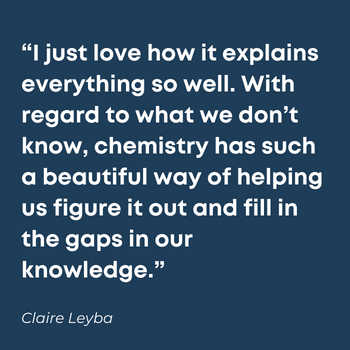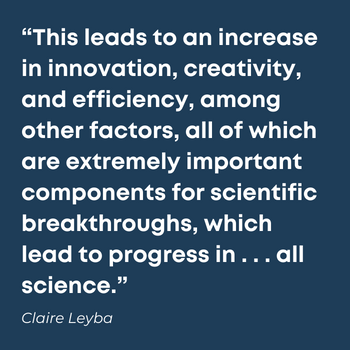Highlighting Women in Science: Healthy Boundaries


The Lab Depot enjoyed talking with Claire Leyba, a particle lab chemist in the chemical quality department at a major pharmaceutical company. She is also a graduate student studying for a Master of Science in Pharmaceutical Chemistry at the University of Kansas. Her expertise focuses on quality control of visible and subvisible particulate matter in sterile injectable pharmaceutical products. Claire’s role plays a pivotal part in manufacturing injectables because too much particulate can lead to health problems upon injection. Subvisible particulate must be checked for all sterile injectables. However, quality control for visible particulate means that vials or syringes containing particulate seen by the naked eye are rejected on inspection after manufacturing. The rejected product goes to Claire in her lab for her team to identify the particulate to help investigators determine where it came from and how to keep it from happening again.
A Busy Schedule
As a full-time chemist and a graduate student, every day looks a little different for Claire, depending on her work and class schedules. She is also a part-time nanny, adding another element to her busy schedule. As for her lab work, quality control testing for subvisible particulate is more predictable day-to-day. Helping investigators test for visible particulate matter requires more flexibility and depends on which drugs are manufactured each week. Some medications tend to have more issues than others. “I could get 10 investigations in one week or ten investigations in one day. I usually arrive at the lab two to three hours before anyone else. I can enjoy working in peace and quiet due to the flexibility in my lab. It works great for me as a graduate student.” Upon arrival, Claire checks the drop-boxes for subvisible particulate matter testing in several different spots around the labs on site. After gathering the samples that need testing, she goes to the locker to change into scrubs. Her lab is in the manufacturing area and must be a controlled environment. Because of the nature of particulate matter testing, the lab must be clean and as free of additional contaminants as possible. Special hoods and other safety equipment are used in the lab to perform all testing preparation. Once she is in the lab ready to test, she must look at her sample population and check the weekly release lists to determine which samples should be tested based on what needs to go out first. Sometimes she has investigations that take top priority, and in that situation, those samples are tested and evaluated first.
Once testing is complete for the morning, Claire goes to lunch, where she will either watch a graduate school lecture or do some standard operating procedures (S.O.P.) reading for work. After lunch, she returns to the lab to complete more investigations or test the samples she prepared that morning and either write reports or record her testing results. After work, she nannies part-time, so she sometimes has to pick up the kids from school, feed them dinner, and wait for their parents to come home. After that, she goes home to study or relax, depending on what her graduate school schedule requires. While studying for her Master’s degree, Claire hopes to eventually obtain her Ph.D. at the same school.


Passionate Curiosity
When asked where she found her passion for science, specifically chemistry, Claire credits early exposure to science and a natural curiosity about how the world around her works. Her father’s passion for science, his career as a Nuclear Chemist, and his academic work has also inspired her. Growing up, she wanted to be a veterinarian, eventually leading her to want to be a physician. Upon starting her undergraduate coursework, she began with a pre-med concentration and fell in love with chemistry. “I just love how it explains everything so well. With regard to what we don’t know, chemistry has such a beautiful way of helping us figure it out and fill in the gaps in our knowledge.” Regarding her current work, Claire considers the most rewarding aspect to be the testing she completes to ensure that her company’s products are safe for use. If a scientist like her was not doing particulate testing, her company could not release what is produced, and the public could not use the products.
“We make a lot of antibiotics, anesthetics, and pain medications. Just knowing that I get to have a part of getting life-enhancing medications out the door is really rewarding for me.” While she has yet to decide on a thesis topic for her graduate studies, she hopes to be involved in drug discovery, which would be considered part of the pre-clinical stage of delivering life-saving or enhancing drugs to people who need them.
Diversity in Science
Like several other scientists in this article series, Claire believes it is important for a diverse population to participate in science. “This leads to an increase in innovation, creativity, and efficiency, among other factors, all of which are extremely important components for scientific breakthroughs, which lead to progress in medicine, energy, and all science. A great example in the real world is knowing that in federally funded clinical trials, it is illegal to not include women and minorities in the subject population. So, if it is that important to include women and minorities in these subject populations, couldn’t one come to the conclusion that it's equally important for women and minorities to be included on the research side of things as well, as scientists?” Claire’s number one piece of advice to women considering a career in science is for them to advocate for themselves, especially around pay, because no one else will advocate for them. She points out that expecting someone to do that for you is unrealistic.


Another important element is setting and maintaining professional boundaries with management and colleagues. “If you say I am leaving at five and transitioning to family time, then you leave at five and have your family time.” She also points out the importance of going out of your way to empower the women around you, and while it may be unrealistic to expect someone to advocate for you, it is imperative to do what you can for other women in the same field.
Balancing Work and Free Time
In her free time, Claire loves reading autobiographies of people who have overcome something significant and eventually go on to find success and happiness. She finds it inspiring to know that if other people can endure some of the terrible things they do and find a better life, she can make it through anything. She also loves reading mysteries and, as a kid, loved Nancy Drew books. She enjoys swimming and camping at the lake. She loves traveling and spending time with friends, family, and her cat Charlie, her pride and joy. Hearkening to her own advice, Claire manages a healthy work/life balance by maintaining clear, healthy boundaries for herself and doing what she can to separate herself from work when she is not there. She admits that this is a challenging thing for her to do. “It is especially hard as I am new to the workforce and industry. I want to go the extra mile and make a name for myself, letting other managers know I am good at what I do and willing to help. I believe I achieve this, but I have to stick to my boundaries while still going above and beyond. I am committed and give 110% when I work, which is obvious, but I am allowed to say, ‘I am done for the day. This can wait until tomorrow. I am going home.’”
Women in Science Article Series
In this article series, The Lab Depot hopes to honor the International Day of Women and Girls in Science by building an awareness of the women doing the work daily. Mothers, daughters, wives, friends, caregivers, and colleagues. These are fascinating stories of commitment, dedication, transition, and a great love for the potential to improve the world, found in all sciences. We hope you enjoy learning more about these intelligent chemistry, biology, physics, and engineering contributors. If you are a woman in science or know one whom you greatly respect, let us know! Tell us about your path, or hers, using the comments section on any of our Women in Science social media posts, or email our Communications Officer, Susie Csomor: [email protected].

